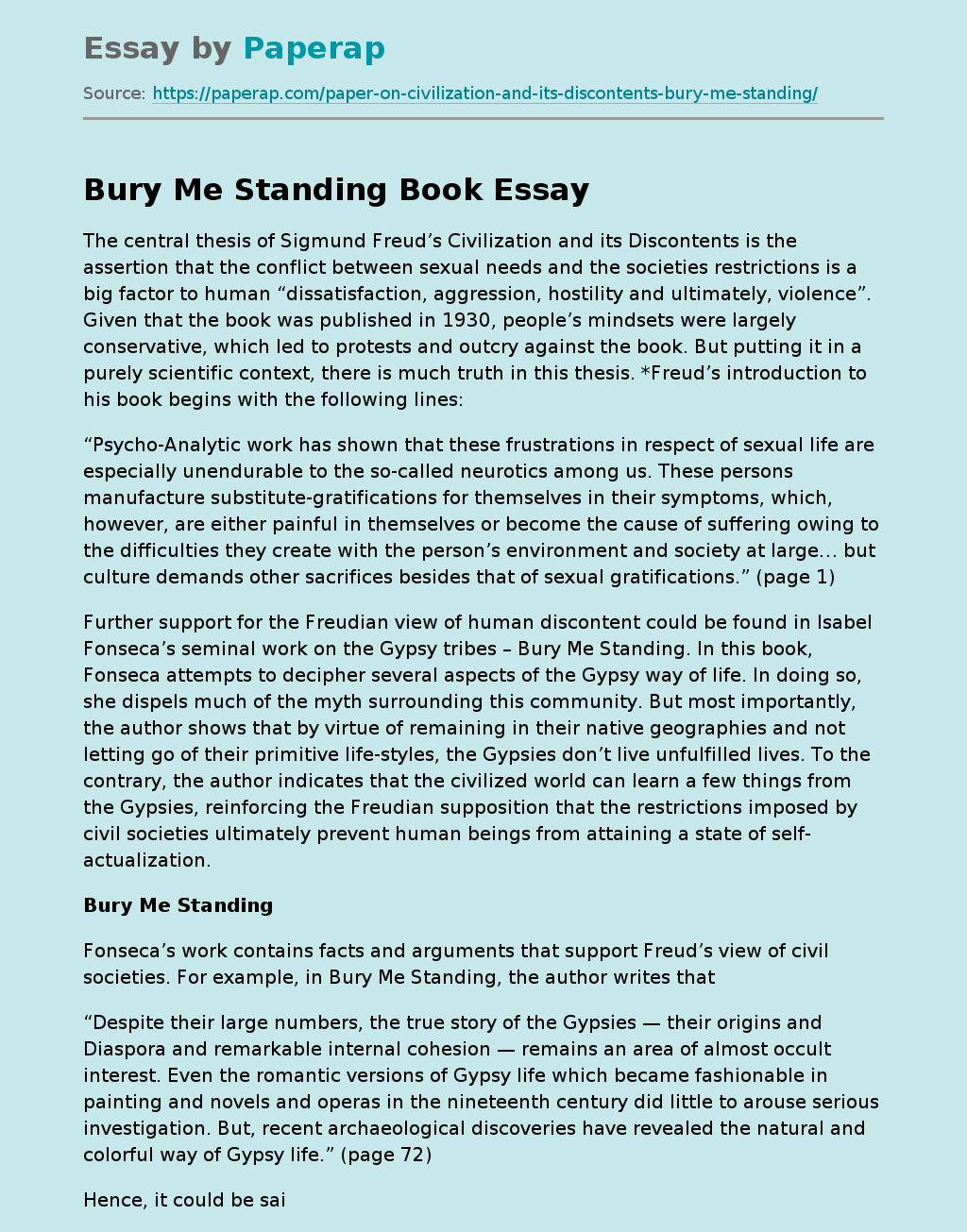Bury Me Standing Book
The central thesis of Sigmund Freud’s Civilization and its Discontents is the assertion that the conflict between sexual needs and the societies restrictions is a big factor to human “dissatisfaction, aggression, hostility and ultimately, violence”. Given that the book was published in 1930, people’s mindsets were largely conservative, which led to protests and outcry against the book. But putting it in a purely scientific context, there is much truth in this thesis. *Freud’s introduction to his book begins with the following lines:
“Psycho-Analytic work has shown that these frustrations in respect of sexual life are especially unendurable to the so-called neurotics among us.
These persons manufacture substitute-gratifications for themselves in their symptoms, which, however, are either painful in themselves or become the cause of suffering owing to the difficulties they create with the person’s environment and society at large… but culture demands other sacrifices besides that of sexual gratifications.” (page 1)
Further support for the Freudian view of human discontent could be found in Isabel Fonseca’s seminal work on the Gypsy tribes – Bury Me Standing.
In this book, Fonseca attempts to decipher several aspects of the Gypsy way of life. In doing so, she dispels much of the myth surrounding this community. But most importantly, the author shows that by virtue of remaining in their native geographies and not letting go of their primitive life-styles, the Gypsies don’t live unfulfilled lives. To the contrary, the author indicates that the civilized world can learn a few things from the Gypsies, reinforcing the Freudian supposition that the restrictions imposed by civil societies ultimately prevent human beings from attaining a state of self-actualization.
Bury Me Standing
Fonseca’s work contains facts and arguments that support Freud’s view of civil societies. For example, in Bury Me Standing, the author writes that
“Despite their large numbers, the true story of the Gypsies — their origins and Diaspora and remarkable internal cohesion — remains an area of almost occult interest. Even the romantic versions of Gypsy life which became fashionable in painting and novels and operas in the nineteenth century did little to arouse serious investigation. But, recent archaeological discoveries have revealed the natural and colorful way of Gypsy life.” (page 72)
Hence, it could be said that the works of Freud and Fonseca are related to each other. Bury Me Standing can be considered as a case study on the Freudian hypothesis stated in Civilization and its discontents. Freud writes that the greatest struggle in life is the “connection between our inner world and the society into which we are born” (page 23). Hence, inner harmony can be achieved only if the social conditions are natural, meaning, that human beings are naturally against any form of structured society. Further, Freud refers to human aggression as “”an original self-subsisting instinctual disposition in man . . . the greatest impediment to civilization” (page 36). And, Fonseca’s Bury me Standing, supports this assertion by exposing the colorful, brisling and natural way of the uncivilized Gypsies that seem to make them a happier people compared to their civilized brethren.
Works Cited:
Sigmund Freud, “Civilizations and its Discontents”, published in 1961 by Hogarth Press, London.
Isabel Fonseca, “Bury Me Standing: The Gypsies and Their Journey”, published in 1995 by Vintage Publications.
The central thesis of Sigmund Freud’s Civilization and its Discontents is the assertion that the conflict between sexual needs and the societies restrictions is a big factor to human “dissatisfaction, aggression, hostility and ultimately, violence”. Given that the book was published in 1930, people’s mindsets were largely conservative, which led to protests and outcry against the book. But putting it in a purely scientific context, there is much truth in this thesis. *Freud’s introduction to his book begins with the following .
Bury Me Standing Book. (2019, Dec 05). Retrieved from https://paperap.com/paper-on-civilization-and-its-discontents-bury-me-standing/

